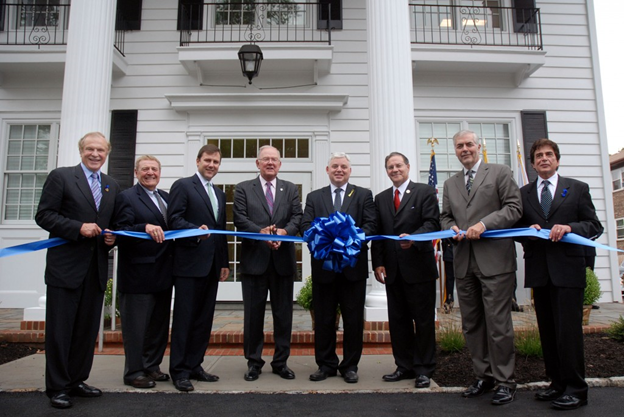Project wins Audrey Nelson award for best practices in community development

l. to r. at Ribbon cutting for Union County Child Advocacy Center last October: Senator Raymond Lesniak, Victor Richel of Union County College, Senator Tom Kean Jr., Union County Prosecutor Ted Romankow, Assistant Union County Prosecutor John Esmerado, Assemblyman Jon Bramnick, Freeholder Daniel Sullivan, and Union County Improvement Authority Chairman Anthony Scutari
WASHINGTON D.C.—The Union County Child Advocacy Center, which moved in October to a new location to serve residents of the county who are victims of and affected by child abuse and sex crimes, has won the National Community Development Association’s Audrey Nelson award for best practices in community development.
The National Community Development Association established the Audrey Nelson Community Development Achievement Award to recognize outstanding uses of the Community Development Block Grant Program and partnerships between local governments and nonprofit organizations to assist low- and moderate-income persons. Audrey Nelson was the first Deputy Executive Secretary of NCDA. The Union County Board of Chosen Freeholders had authorized the use of $250,000 in CDBG funds for the project.
NCDA is a non-partisan national nonprofit membership organization that represents local governments which administer federally supported community, economic development and affordable housing programs. Union County Manager Alfred J. Faella currently serves as the Vice President for NCDA.
Located at 240-242 West Jersey St. in Elizabeth, the Child Advocacy Center is a satellite office of the Union County Prosecutor’s Office. The structure consists of a three-story 11,000 square foot Victorian-era home; the structure itself is more than 100 years old.
Union County Prosecutor Theodore J. Romankow and Assistant Prosecutor John Esmerado have worked for more than a decade to conceptualize, plan, develop and build the new Child Advocacy Center.
The Child Advocacy Center and its multi-disciplinary team offer legal, investigative, therapeutic, medical and child protective services to children from newborns to 17 years of age, who report child maltreatment. The Prosecutor’s Office, Division of Child Protection and Permanency (formerly referred to as DYFS) jointly investigate more than 500 cases a year of child sexual abuse, physical abuse and maltreatment. The Child Advocacy Center receives approximately 2,000 visitors annually including families, police, teachers and witnesses.
“There are few things worse than child abuse,” said Romankow. “I have long been impressed by the hard work ethic and passion demonstrated by the staff with such sensitive investigations.”
In the spring of 2010, Union County entered into a Shared Services Agreement with the Union County Improvement Authority for the purposes of financing and managing the construction of the $3 million project.
“This is not just any building, this is not just a project. This is all about saving the lives of children and giving them another chance in life,” said Union County Improvement Authority Chairman Charlotte DeFilippo. “We are proud to support this effort.”
In addition, the Friends of the Child Advocacy Center, a 501(c)(3) nonprofit corporation, was created to help raise additional funding.
“This Freeholder Board takes pride in supporting this advocacy center that advocates for children who need it the most,” said Freeholder Chairman Linda Carter.
The center houses 26 full time staff, including investigator from the Prosecutor’s Office, Division of Child Protection and Permanency, mental health staff from Trinitas Regional Medical Center, and nursing staff from Runnells Specialized Hospital of Union County.
The center employs an advanced, efficient “wrap around” service model that brings together all existing child abuse services from multiple locations to a single location, providing professional assistance to child abuse survivors such as interviews, intake, medical examination and mental health intake evaluation and counseling, said Romankow. This wrap around service model significantly truncates investigation and treatment from days to hours.
